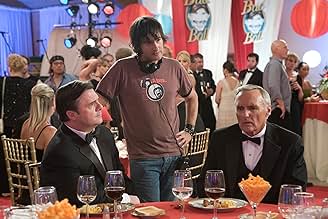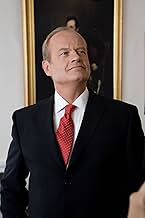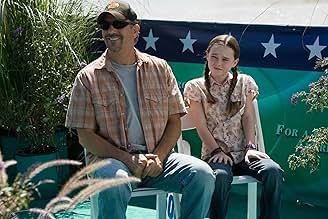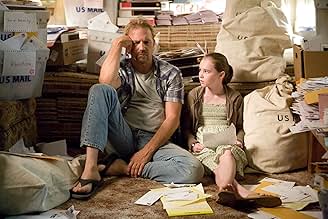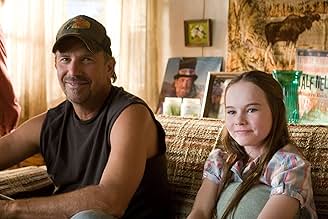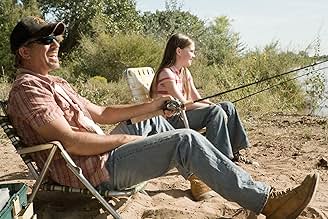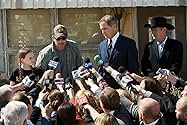VALUTAZIONE IMDb
6,1/10
19.970
LA TUA VALUTAZIONE
Aggiungi una trama nella tua linguaIn a remarkable turn-of-events, the result of the presidential election comes down to one man's vote.In a remarkable turn-of-events, the result of the presidential election comes down to one man's vote.In a remarkable turn-of-events, the result of the presidential election comes down to one man's vote.
- Regia
- Sceneggiatura
- Star
- Premi
- 1 candidatura in totale
Charles Esten
- Lewis
- (as Charles 'Chip' Esten)
Recensioni in evidenza
If the 2000 Presidential election could be decided by a single county in Florida (with a little help from the United States Supreme Court, of course), imagine what it would be like if the decision ever came down to a single individual voter! That's the scenario put forth by "Swing Vote," a political fantasy that will probably be remembered more for launching the career of a talented young actress than for any insight it might offer into the political process.
Bud Johnson is a working-class divorced dad who lives in a broken-down trailer with his bright, twelve-year-old daughter, Molly - a youngster who is as astute and savvy about real world issues and politics as her father is ignorant and apathetic. Through a complicated fluke of fate, Bud finds himself in the unenviable position of being the sole swing vote in an otherwise deadlocked presidential contest. Suddenly, Bud is living in the glare of the media spotlight, besieged by candidates, campaign managers, handlers, celebrities and various special interest groups all vying for his vote.
Political satire rarely works on screen for the simple reason that it is either so slanted (usually towards the liberal side) that it winds up preaching mainly to the converted, or it's kept so inoffensive and generic that it loses any edge it might have had and becomes an exercise in watered-down, self-congratulatory Capraesque populism. "Swing Vote," oddly enough, falls into both categories at once - with conservatives likely to view it as little more than a two-hour commercial for the Democratic Party (or at least the issues they stand for) and move on. In strictly cinematic terms, "Swing Vote," co-written by Jason Richman and Joshua Michael Stern and directed by Stern, is really two movies folded into one. The first is a sometimes touching story of a father/daughter relationship in which the child is parent to the father. Kevin Costner (who pretty much financed the project himself) pours on the charm as a boozy, irresponsible slacker who's more interested in popping open a beer can and plopping down in front of the TV set than in actively rearing his daughter. Relative newcomer Madeline Carroll is a real find as the no-nonsense, wise-beyond-her-years Molly who takes care of her dad and isn't afraid to speak truth to power when the situation calls for it. Whenever the film is concentrating on the interplay between these two characters, it hits a responsive chord in the viewer. In fact, the scene in which Molly confronts the alcoholic mother who abandoned her (wonderfully played by Mare Winningham) makes for some genuinely powerful and gripping human drama.
Unfortunately, the second and much larger portion of the film (that is to say, the political part) doesn't fare nearly so well. Its revelation that politics is a dirty business - i.e. that it often prizes empty platitudes and sound bites over exploring issues of substance, and that it appeals to voters' greed, fears, ignorance and prejudices to win votes - is hardly an earth-shattering one at this late stage of the game, true though it may be. The film has lots of big-name stars - Kelsey Grammar, Dennis Harper, Nathan Lane, Stanley Tucci, George Lopez, Judge Reinhold - and a number of actual TV pundits and commentators throwing themselves into their roles with admirable aplomb, but the material isn't clever or sharp enough to really deliver the goods. Everyone, except for the two main characters, is quickly reduced to a "type" and the attempts at political parody are fairly obvious and lightweight compared to what we find in venues like "The Daily Show" or "The Colbert Report."
"Swing Vote"'s clarion call for all individuals to take their responsibility as citizens seriously and to become actively involved in the political process can't help but be uplifting and inspiring, especially in a presidential election year. The filmmakers just needed a bolder, more sophisticated vehicle from which to sound that call.
My advice is to look past all the political nonsense and concentrate on the beautiful performance by the young Ms. Carroll instead - and be present at the birth of a brand new star.
Bud Johnson is a working-class divorced dad who lives in a broken-down trailer with his bright, twelve-year-old daughter, Molly - a youngster who is as astute and savvy about real world issues and politics as her father is ignorant and apathetic. Through a complicated fluke of fate, Bud finds himself in the unenviable position of being the sole swing vote in an otherwise deadlocked presidential contest. Suddenly, Bud is living in the glare of the media spotlight, besieged by candidates, campaign managers, handlers, celebrities and various special interest groups all vying for his vote.
Political satire rarely works on screen for the simple reason that it is either so slanted (usually towards the liberal side) that it winds up preaching mainly to the converted, or it's kept so inoffensive and generic that it loses any edge it might have had and becomes an exercise in watered-down, self-congratulatory Capraesque populism. "Swing Vote," oddly enough, falls into both categories at once - with conservatives likely to view it as little more than a two-hour commercial for the Democratic Party (or at least the issues they stand for) and move on. In strictly cinematic terms, "Swing Vote," co-written by Jason Richman and Joshua Michael Stern and directed by Stern, is really two movies folded into one. The first is a sometimes touching story of a father/daughter relationship in which the child is parent to the father. Kevin Costner (who pretty much financed the project himself) pours on the charm as a boozy, irresponsible slacker who's more interested in popping open a beer can and plopping down in front of the TV set than in actively rearing his daughter. Relative newcomer Madeline Carroll is a real find as the no-nonsense, wise-beyond-her-years Molly who takes care of her dad and isn't afraid to speak truth to power when the situation calls for it. Whenever the film is concentrating on the interplay between these two characters, it hits a responsive chord in the viewer. In fact, the scene in which Molly confronts the alcoholic mother who abandoned her (wonderfully played by Mare Winningham) makes for some genuinely powerful and gripping human drama.
Unfortunately, the second and much larger portion of the film (that is to say, the political part) doesn't fare nearly so well. Its revelation that politics is a dirty business - i.e. that it often prizes empty platitudes and sound bites over exploring issues of substance, and that it appeals to voters' greed, fears, ignorance and prejudices to win votes - is hardly an earth-shattering one at this late stage of the game, true though it may be. The film has lots of big-name stars - Kelsey Grammar, Dennis Harper, Nathan Lane, Stanley Tucci, George Lopez, Judge Reinhold - and a number of actual TV pundits and commentators throwing themselves into their roles with admirable aplomb, but the material isn't clever or sharp enough to really deliver the goods. Everyone, except for the two main characters, is quickly reduced to a "type" and the attempts at political parody are fairly obvious and lightweight compared to what we find in venues like "The Daily Show" or "The Colbert Report."
"Swing Vote"'s clarion call for all individuals to take their responsibility as citizens seriously and to become actively involved in the political process can't help but be uplifting and inspiring, especially in a presidential election year. The filmmakers just needed a bolder, more sophisticated vehicle from which to sound that call.
My advice is to look past all the political nonsense and concentrate on the beautiful performance by the young Ms. Carroll instead - and be present at the birth of a brand new star.
My son tells me that I don't understand what young people think is funny. And he's right. I'm not into cringe comedies like Borat or teen sex comedies like Superbad. So when I give Swing Vote 9 out of 10, I guess I have to limit my recommendation to those over 50. If you're too young to remember Kevin Costner's last great movie, I'm not so sure you'll like this one. You see, no one gets humiliated and you don't hear any jokes about sex or bodily functions. It's an old-fashioned comedy that my wife, my cousin and I, all near 60, loved. If you are in that age range, ignore the critics and the IMDb rating. We laughed all the way through. The editing is fast paced so that you never get bored. Some critics have criticized Swing Vote for being lightweight, but it is really more dramedy than straight comedy. There are several serious themes including divorce and civic responsibility. This is Costner's best performance in many years. And Madeline Carroll, who plays his daughter, is amazing. Watch out, Dakota Fanning and Abigail Breslin. This girl can play comedy and drama with equal aplomb. The scene where she cries in front of her class brought many to tears in our audience.
Kevin Costner was actually in another decent movie. His last movie I saw, Mr. Brooks, was pretty good also. I would call this movie a political satire, that tries to be a little funny at times. However, the idea that one guy determines the presidential election is absurd, but if you can get past that, then the plot is OK. It was funny how the movie had the political parties doing adds for things they oppose. Example, the democrats supporting pro life because Bud says he's pro life.
The plot is struggling, every day man, Bud Johnson, just got laid off. He has a very smart daughter and she cares about the presidential election. Bud promises to vote since Molly thinks it's important. But, when he doesn't show, Molly votes in his place but the power goes out and the vote didn't count. The election comes down to New Mexico and for some reason, not told in the movie, Bud's vote will decide the electoral votes. I mean, how could the votes be even for each side and even if they were very close, how many months would it take for all the recounts that would take place. But any way, it's up to Bud, whom doesn't care about politics. He becomes an instant celebrity and is courted by both candidates. By the end of the film, Bud grows an appreciation for the political scene and realizes that it is important to care about social issues.
FINAL VERDICT: Funnier than I thought and provides a message. Plus, the movie doesn't try to say that one party is better than the other.
The plot is struggling, every day man, Bud Johnson, just got laid off. He has a very smart daughter and she cares about the presidential election. Bud promises to vote since Molly thinks it's important. But, when he doesn't show, Molly votes in his place but the power goes out and the vote didn't count. The election comes down to New Mexico and for some reason, not told in the movie, Bud's vote will decide the electoral votes. I mean, how could the votes be even for each side and even if they were very close, how many months would it take for all the recounts that would take place. But any way, it's up to Bud, whom doesn't care about politics. He becomes an instant celebrity and is courted by both candidates. By the end of the film, Bud grows an appreciation for the political scene and realizes that it is important to care about social issues.
FINAL VERDICT: Funnier than I thought and provides a message. Plus, the movie doesn't try to say that one party is better than the other.
8somf
Yes, the whole concept is absurd, and as a result the film will probably take a lot of criticism, but I really enjoyed every minute of it at an early screening this evening. I enjoy Kevin Costner's work except when he tries to go action hero and he is thankfully getting too old for that unless he decides to buy growth hormone from Stallone or something. He was terrific in Mr. Brooks and he excels once again in a totally different role. It is the sort of character that he does best, more akin to his "Bull Durham" role.
The real find of the film was Madeline Carrol who played his daughter. She joins Abagail Breslin, Dakota Fanning , and Anna Sophia Robb in a current crop of extremely talented tweeners.
I enjoyed the entire cast and it was great to see Judge Reinhold for the first time in awhile.
The whole concept of how Costner's vote becomes so important is one that is hard to swallow, but if you go along for the ride I promise that you will have a great time.
Late in the film Mare Winningham appears in perhaps the films most powerful though least appropriate scene. It is her only scene. I believe it was used to hammer in a serious message though the scene had little to do with the message of the film other than shift to a more sober mood. Sober may not have been the best choice of words to describe the scene though.
One of the nicer aspects of the film is its terrific music. A mix of tunes from several decades centered around Marshall Tucker's "Can't You See" really makes for a nice soundtrack.
Ultimately the film has a great message about the importance of one person, one vote. And if it gets a lot more democrats(whoops I mean Americans) to vote this year, then in my opinion it will have done a great public service in addition to being solidly entertaining. And no, it does not have a liberal agenda, so all you Rush fans need to hold judgment before slamming the film. Unlike this reviewer, the film is really good at not taking a political stance. The film depicts all politicians as if they would stoop to anything to get elected, and garners a lot of laughs with that premise.
I want to add one last thing. I would call this a family movie except for the profanity. I took my 9 year old precocious daughter and she loved it, but there was actually a running joke about Costner's character's love of swearing. So if a little swearing and some references to controversial issues (abortion, gay marriage, legal pot) are OK with you, bring the kids. Like I said, it does have a good message.
The real find of the film was Madeline Carrol who played his daughter. She joins Abagail Breslin, Dakota Fanning , and Anna Sophia Robb in a current crop of extremely talented tweeners.
I enjoyed the entire cast and it was great to see Judge Reinhold for the first time in awhile.
The whole concept of how Costner's vote becomes so important is one that is hard to swallow, but if you go along for the ride I promise that you will have a great time.
Late in the film Mare Winningham appears in perhaps the films most powerful though least appropriate scene. It is her only scene. I believe it was used to hammer in a serious message though the scene had little to do with the message of the film other than shift to a more sober mood. Sober may not have been the best choice of words to describe the scene though.
One of the nicer aspects of the film is its terrific music. A mix of tunes from several decades centered around Marshall Tucker's "Can't You See" really makes for a nice soundtrack.
Ultimately the film has a great message about the importance of one person, one vote. And if it gets a lot more democrats(whoops I mean Americans) to vote this year, then in my opinion it will have done a great public service in addition to being solidly entertaining. And no, it does not have a liberal agenda, so all you Rush fans need to hold judgment before slamming the film. Unlike this reviewer, the film is really good at not taking a political stance. The film depicts all politicians as if they would stoop to anything to get elected, and garners a lot of laughs with that premise.
I want to add one last thing. I would call this a family movie except for the profanity. I took my 9 year old precocious daughter and she loved it, but there was actually a running joke about Costner's character's love of swearing. So if a little swearing and some references to controversial issues (abortion, gay marriage, legal pot) are OK with you, bring the kids. Like I said, it does have a good message.
"Swing Vote" is a good movie. It could have been great, but it isn't, but it is still good. At its best, it invokes Frank Capra's classic films on politics, including "Meet John Doe" and "Mr. Smith Goes to Washington." It never reaches their level, though, and that failure to hit the top is a bit frustrating.
An older, dumpier, and shabbier Kevin Costner is the best part of the film. Costner is a star and that shows here. Even the grunge that is his costume in almost every scene can't disguise his charisma. Costner's voice has not aged and he uses it to great effect, especially in a final speech.
The film draws laughs by parodying our two major political parties, with a Democratic presidential candidate starring in the funniest anti-abortion TV commercial ever made (no doubt its competition was slim, but it is very funny) and a Republican presidential candidate touting his party's tender concern for the environment.
These excellent scenes make you wish that the movie had gone deeper. It doesn't, though. It veers off into dead-end soap opera subplots about Costner's daughter's boyfriend from school and her attempt to live with her estranged mother (Mare Winningham, in a role that should have ended up on the editing room floor, as it contributes nothing to the film.) The casting wasn't great. The two presidential candidates and their aids end up being cardboard cut-out stereotypes of Machiavellian evil (Stanley Tucci) and compromise (Nathan Lane). Kelsey Grammar and Dennis Hopper, as the candidates, never transcend their "Frasier" and "Easy Rider" personas. Other actors, perhaps unknowns, should have been cast in these two key roles.
Paula Patton, the woman who played what would have been the Barbara Stanwyck role in the Frank Capra movie, was pretty as a little doll and a complete bore. This is part of a pattern in today's Hollywood; female leads must have the perfectly perky looks of a plastic doll; there's no need for them to be talented. Male leads, like Costner, can be beat-up, and slovenly, but must be talented. Patton's role, that of the desperate, sharp, female reporter who gains inside knowledge of a national story, is underwritten, and she does nothing with it. It's a dead-end, and that's a shame. It makes me want to rewatch "Meet John Doe" in which Stanwyck worked so well as the female reporter.
Overall, though, this movie is better than much else at the multiplex, and it at least ventures into the world of ideas.
An older, dumpier, and shabbier Kevin Costner is the best part of the film. Costner is a star and that shows here. Even the grunge that is his costume in almost every scene can't disguise his charisma. Costner's voice has not aged and he uses it to great effect, especially in a final speech.
The film draws laughs by parodying our two major political parties, with a Democratic presidential candidate starring in the funniest anti-abortion TV commercial ever made (no doubt its competition was slim, but it is very funny) and a Republican presidential candidate touting his party's tender concern for the environment.
These excellent scenes make you wish that the movie had gone deeper. It doesn't, though. It veers off into dead-end soap opera subplots about Costner's daughter's boyfriend from school and her attempt to live with her estranged mother (Mare Winningham, in a role that should have ended up on the editing room floor, as it contributes nothing to the film.) The casting wasn't great. The two presidential candidates and their aids end up being cardboard cut-out stereotypes of Machiavellian evil (Stanley Tucci) and compromise (Nathan Lane). Kelsey Grammar and Dennis Hopper, as the candidates, never transcend their "Frasier" and "Easy Rider" personas. Other actors, perhaps unknowns, should have been cast in these two key roles.
Paula Patton, the woman who played what would have been the Barbara Stanwyck role in the Frank Capra movie, was pretty as a little doll and a complete bore. This is part of a pattern in today's Hollywood; female leads must have the perfectly perky looks of a plastic doll; there's no need for them to be talented. Male leads, like Costner, can be beat-up, and slovenly, but must be talented. Patton's role, that of the desperate, sharp, female reporter who gains inside knowledge of a national story, is underwritten, and she does nothing with it. It's a dead-end, and that's a shame. It makes me want to rewatch "Meet John Doe" in which Stanwyck worked so well as the female reporter.
Overall, though, this movie is better than much else at the multiplex, and it at least ventures into the world of ideas.
Lo sapevi?
- QuizStanley Tucci's line "If you'd ever met my mother, you'd understand," was an ad-lib.
- BlooperAir Force One is never allowed to sit idle on a runway with the President on board.
- Citazioni
Molly Johnson: I want to live with Mom.
Bud Johnson: So do I.
- Curiosità sui crediti"and introducing Madeline Carroll"
- Colonne sonoreCan't You See
Written by Toy Caldwell Jr. (as Toy Caldwell)
Performed by The Marshall Tucker Band
Courtesy of Shout Factory, LLC
By Arrangement with Natural Energy Lab
I più visti
Accedi per valutare e creare un elenco di titoli salvati per ottenere consigli personalizzati
Dettagli
Botteghino
- Budget
- 21.000.000 USD (previsto)
- Lordo Stati Uniti e Canada
- 16.289.867 USD
- Fine settimana di apertura Stati Uniti e Canada
- 6.230.669 USD
- 3 ago 2008
- Lordo in tutto il mondo
- 17.635.397 USD
- Tempo di esecuzione
- 2h(120 min)
- Colore
- Mix di suoni
- Proporzioni
- 2.35 : 1
Contribuisci a questa pagina
Suggerisci una modifica o aggiungi i contenuti mancanti







